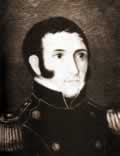Related Research Articles

Francisco Ramón de Vicuña Larraín was a Chilean political figure. He served twice as acting President of Chile in 1829. Francisco Vicuña was of Basque descent.

José Mariano de la Cruz de la Riva Agüero y Sánchez Boquete was a Peruvian soldier and politician who served as the first President of Peru and the second president of North Peru, a constituent country of the Peru–Bolivian Confederation. A leading figure of the Peruvian War of Independence, he was president of Peru in 1823, being the first head of state to serve as President of the Republic and to wear the two-color presidential sash as a symbol of the power he exercised. Although this power was de facto, that is, born from a coup d'état and not by popular will expressed in elections, since it was imposed by the Peruvian Army through the so-called Balconcillo mutiny, which ordered Congress to dismiss the Supreme Governing Junta headed by José de La Mar. He governed for four months before being replaced by the Marquis of Torre Tagle.
Tomás López Marín y González de Poveda, 1st Marquis of Cañada Hermosa was a Spanish colonial administrator who served as Royal Governor of Chile.

Francisca Xaviera Eudoxia Rudecinda Carmen de los Dolores de la Carrera y Verdugo, better known as Javiera Carrera, was a Chilean independence activist. Together with her brothers José Miguel, Juan José and Luis, she was one of the leading figures of the early Chilean struggle for independence during the period known as the Patria Vieja. She is credited with having sewn the first national flag of Chile and is considered to be the "Mother of Chile".

Juan de la Cruz Mourgeón y Achet (1766–1822) was a Spanish military commander and colonial administrator.

Pedro Ortiz de la Barriere Castro was a Spanish politician, military officer, and lawyer who served as the colonial intendant of the Intendancy of San Salvador from 1819 until 1821. He also served the first head of state of the Province of San Salvador after the signing of the Act of Independence of Central America from September to November 1821. He was killed in action at the Battle of Milingo during the First Central American Civil War.
Manuel Alberto Freire de Andrade y Armijo was a Spanish cavalry officer and general officer during the Peninsular War, and later Defense Minister.

Martín Calvo de Encalada y Recabarren was a Chilean politician who participated as a member of Congress during the Chilean War of Independence.

Francisco de Aguirre was a Spanish conquistador who participated in the conquest of Peru, Bolivia, Chile and Argentina.
Marina Ortiz de Gaete González was the wife of Pedro de Valdivia, and played an important role in the politics of the conquest and early history of the Captaincy General of Chile.
Alonso de Góngora Marmolejo (1523–1575) was a Spanish conquistador and chronicler of the early conquest and settlement of the Captaincy General of Chile, and the start of the Arauco War.
Pedro Mariño de Lobera (1528–1594) was a Galician soldier, conquistador and chronicler of the Arauco War in the Captaincy General of Chile.

Jerónimo de Alderete y Mercado was a Spanish conquistador who was later named governor of Chile, but died before he could assume his post.
Alonso de Figueroa y Cordova was a Spanish soldier who, in the days of the reign of Philip IV of Spain, temporarily carried out the position of Captain General and Royal Governor of Chile, besides president of its Real Audiencia of Chile. His government lasted for 13 months, between April 1649 and May 1650. He was the grandfather of the Chilean historian Pedro de Cordoba y Figueroa.
Admiral Pedro Porter y Casanate was a Spanish sailor, soldier, explorer of California and Royal Governor of Chile from 1656 to 1662.

The Chilean Declaration of Independence is a document declaring the independence of Chile from the Spanish Empire. It was drafted in January 1818 and approved by Supreme Director Bernardo O'Higgins on 12 February 1818 at Talca, despite being dated in Concepción on 1 January 1818. The ceremony of independence was performed on 12 February 1818, the first anniversary of the Battle of Chacabuco.
José Ravest y Bonilla was a Chilean lawyer, writer, and judge.
The following lists events that happened during 1833 in Chile.
Agustín Manuel Hipólito Orella Macaya, known simply as Manuel Hipólito Orella, was a Chilean naval officer who made a career in the Chilean Navy. He was one of the first Chilean midshipmen who entered the nascent navy in 1818. He joined the First Chilean Navy Squadron and participated in the naval war for the independence of Chile and Peru. Likewise, also spent time in the Chilean Army in the infantry branch. Furthermore, he held several important positions in the navy until his death in 1857.

Bernardo de Vera y Pintado, was an Argentine-Chilean lawyer and politician. He was the author of the lyrics of both the Hymn to the Victory of Yerbas Buenas (1813) and the first National Anthem of Chile (1819).
References
- ↑ Revista de estudios históricos (in Spanish). 1999. p. 27.
- 1 2 Donoso, Ricardo (1941). El marqués de Osorno, don Ambrosio Higgins, 1720-1801 (in Spanish). Publicaciones de la Universidad de Chile. p. 157.
- ↑ Barreda, Rafael (1898). Diccionario biográfico contempráneo sudamericano... (in Spanish). H. Lacquanti y ca. p. 66.
- 1 2 Perez Herrero, Pedro (2015). Fiscalidad, integración social y política exterior en el pensamiento liberal atlántico (1830-1930) (in Spanish). Marcial Pons. pp. 198–199. ISBN 978-84-9123-174-5.
- ↑ Cortés, José Domingo (1876). Diccionario biográfico americano (in Spanish). Tipografia Lahure. p. 144.
- ↑ Figueroa, Pedro Pablo (1888). Diccionario biográfico general de Chile: 1550-1887 (in Spanish). Impr. "Victoria" de H. Izquierdo. p. 155.